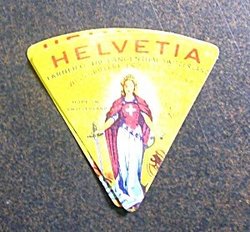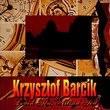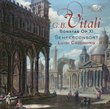| All Artists: Ernest Bloch, Lior Shambadal, Orchestre De La Suisse Romande, Gerard Causse Title: Ernest Bloch: Helvetia; Suite pour alto et orchestre; Suite Hebraique pour alto et orchestre Members Wishing: 0 Total Copies: 0 Label: Cascavelle Release Date: 9/27/2005 Genre: Classical Style: Symphonies Number of Discs: 1 SwapaCD Credits: 1 UPC: 409350617027 |
Search - Ernest Bloch, Lior Shambadal, Orchestre De La Suisse Romande :: Ernest Bloch: Helvetia; Suite pour alto et orchestre; Suite Hebraique pour alto et orchestre
 | Ernest Bloch, Lior Shambadal, Orchestre De La Suisse Romande Ernest Bloch: Helvetia; Suite pour alto et orchestre; Suite Hebraique pour alto et orchestre Genre: Classical |
Larger Image |
CD DetailsSimilar CDs |
CD ReviewsDespite Helvetia's rarity value, the two compositions for vi Discophage | France | 08/05/2007 (4 out of 5 stars) "Though he moved to the United States in 1916 at the age of 36 and spent a significant part of his life there, even taking American citizenship in 1924, Ernest Bloch, born in Geneva in 1880 (and died in Portland, Oregon, in 1959) never lost sight of his Swiss origins and background, even returning there (and in the French nearby region of Haute-Savoie) from 1930 to 1939.
However Helvetia, subtitled "The Land of the Mountains and its People, Symphonic Fresco for Orchestra", his hommage to his Land of birth, though the first sketches date from 1900, wasn't composed in Switzerland but at the end of Bloch's first stay in the US, in 1928, and premiered in 1932 by the Chicago Symphony Orchestra conducted by Frederick Stock. It is the third pendant in a triptych which includes the early "Israël" (completed in 1916) and "America, an Epic Rhapsody", the composer's tribute to his land of adoption (1929). I can't say I warmed up to this 24' composition very much. Bloch's language hadn't evolved much since Schelomo, just lost its Jewish flavor in favor of a Swiss one, with numerous quotes of Swiss folk or patriotic tunes (and the substitution isn't so auspicious); it is even far more conservative than the daring and brutal chamber music he composed in the mid 1920s. It is a Neo-Romantic work full of big gestures, descriptive in a cinematographic way (complete with the battle scene starting at 15:35 and ending in bombastic triumph at 17:10), and its effusive lyricism verges on the trite and bombastic. It very much recalls the nationalistic and intentionally popular compositions written by Bloch's compatriot and contemporary Arthur Honegger (Roi David, Nicolas de Flue) - not the best of his output either. That the substitution of a Swiss to the Jewish inspiration in Helvetia wasn't a gain is further borne out by the two works for Viola and Orchestra. The Suite for viola was orchestrated in 1920 after the Suite for viola and piano from 1919, and actually Bloch claimed that these melodies weren't intentionally Jewish, but rather represented his imaginary vision of the Far East: Java, Sumatra, Borneo (Koechlin's Jungle Book isn't far away, and not just in its programmatic reference, but in its compositional style as well: try it on Charles Koechlin: Le Livre de la Jungle (The Jungle Book) - Rheinland-Pfalz Philharmonic / Leif Segerstam, Koechlin: The Jungle Book, Symphonic Poems or Koechlin - Le Livre de la jungle (Jungle Book) / Vermillion · Trussel · Le Texier · O.N. de Montpellier · Bedford). The Suite Hébraïque is a much later piece, composed in 1951 (there is also a version for Viola and Piano) and, with the contemporary Meditation & Processional for Viola and Piano, it marks the composer's return to his Jewish inspiration. Despite being so wide apart in their respective date of composition, both works are the equivalent for viola to Schelomo. They are full of lush and sensuous melodies and orchestration, varied in atmosphere, from the heroic to the meditative but, maybe because they aren't as blatantly programmatic as Helvetia, I don't hear in them an ounce of triteness or bombast. Though (or maybe because) not particularly modern in their musical language, I wouldn't hesitate to rank them among the major contributions to the genre written in the first fifty (well - roughly) years of the 20th century, along with similar works by Bartok, Hindemtih, Walton and Martinu. Caussé plays with his usual husky and juicy tone. Despite Helvetia's rarity value (there is another recording, published at the same time as this one: Bloch: Helvetia; Achron: Piano Concerti; Saminsky: The Vow), the two compositions for viola are the main reason to buy this disc. " |



